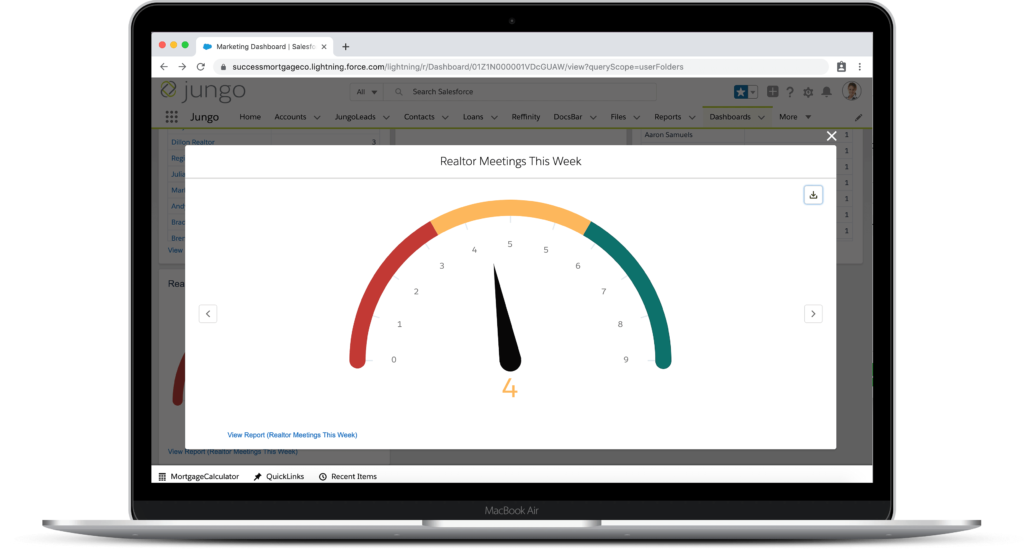
We’ve talked quite a bit about investing in your growth here on the Jungo blog. Loan officer coaching, continuing your education through loan officer resources, and committing to a daily schedule are all ways that loan officers can find success through self-improvement. Making a loan officer business plan isn’t all about the numbers: it’s also about investing in yourself through goal setting.

But, why should you care about investing in yourself in the first place? Well, in short, because it may just change your life. At the very least, it will change your business.
Self-improvement as a loan officer was another major theme at Sales Mastery. The speakers shared many helpful tips on how to become the best loan officer through investing in your future. It may not be the traditional loan officer business plan, but investing in your growth will lead to your success, both personally and professionally.
So, here are a few steps to getting started on a loan officer business plan:
- Why Do You Need to Invest in Yourself?
- Visualize Your Future
- Understand Your Strengths
- Be Realistic
- Commit To It
Why Do You Need to Invest in Yourself?
The first step in improving yourself and your loan officer business plan is recognizing why it’s important. Rachel Pierce says, “Invest in yourself. If you’re going to grow, you really have to invest in yourself and figure out what’s going to take you to the next level. Be a problem solver. Be a great leader.”
By investing in your own growth, you’ll be better equipped to succeed both personally and professionally. You’ll have a better loan officer business plan for your future, which will help you spend your days more efficiently. Additionally, you’ll be aware of any potential roadblocks you may hit. Therefore, you’ll be better prepared for how to handle them.
Understand Your Strengths (and Weaknesses)
Next, it’s also important to be realistic about yourself. It’s a waste of your time to try to excel at something you’re not good at, especially if you’re leaving other skill sets unused. Instead, consider your strengths, and be honest with yourself about your weaknesses. You may need to ask outside sources for help on this: ask trusted people in both your personal and professional worlds to help you understand yourself better.
Risha Kilaru, the #1 female loan originator in the United States, says, “You know yourself better than anyone else. You know what you’re capable of, you know what your strengths are, you know what your weaknesses are. Just understand what you’re best at: focus on that, and you’ll do very well.”
Visualize Your Future
Next up, you need to decide what you would like out of your future. By visualizing your ideal self, you can begin to see where you may need to invest some time and energy to growth. In this way, while discussing personal growth, Travis Gregg says, “I knew I needed to change, but I didn’t know how. Breaking it down bite by bite, I can construct what that looks like and really focus on what it takes to get there. Comfort is the enemy of progress. I don’t want to be complacent, I want to change. I know it’s going to be hard, but the sooner I do it, the sooner I’ll get through it.”
Lay Out The Steps
Since you have your goals in mind, you can now decide how to span the gap between where you are now, and where you’d like to be. James Pulsipher says, “What I want is on the other side of my comfort zone.”
Ask yourself, how can I reach my goals? What will I need to do differently? For example, perhaps you’d like to increase your loans closed per month from 5 to 10 in the next 2 years. Decide on how you will reach this goal, and write down those steps. Maybe you will increase your lead generation techniques by committing to a certain number of realtor partner meetings a week. Or, you could decide to hand out 3,000 business cards in 90 days, like Christy Solar does.
Whatever you decide to do differently, make sure that your goals are trackable and specific. Otherwise, you’ll never be able to tell if you’re truly hitting your benchmarks! Check in on your loan officer business plan on a regular basis: are you missing, hitting or surpassing your goals? Therefore, do you need to adjust your methods?
As a CRM, we (of course), fully embrace tracking progress–which can be done through reports in Jungo. Because Jungo is fully customizable, you can set a goal like a certain number of realtor partner meetings a week, and then measure those on your dashboard.

Just remember what Todd Duncan says on this subject: “How you handle now determines where you’ll be then.”
Commit To It
So, now that you have a loan officer business plan and the steps that it will take to get you there, it’s time to implement. It’s tempting to think that the hard work is over now that you’ve made your plan. Unfortunately, that’s not the case–now is when the work truly begins.
Tony Markland is brutally honest, saying, “To get there, you have to apply a lot of discipline and commitment because it’s not easy.”
Chris Hallows echoes this, saying, “There is no elevator to success. You have to take the steps.”
So, committing to your plan for self-improvement is all about consistency, and continuing on even if you fail once in a while (which you will!).
CRM Tip
Finally, once you have the steps, set up a process that makes YOU accountable for following. Setting a daily task for yourself in your CRM that you have to complete at the same time each day is a great way to do this. Maybe that task is as simple as “contact one new realtor.” But as a result of having the task, and the daily reminder, you’ll be closer to actually doing it.
Bottom Line
Although self-investment is not a traditional loan officer business plan, it can be a great way to help you reach your personal and professional goals. The most important thing to remember is that failure will happen. Therefore, what matters isn’t being perfect, but continuing on with your new practices after a so-called failure.
You don’t want to miss out on a single Sales Mastery blog post–sign up for Jungo’s blog newsletter below.












